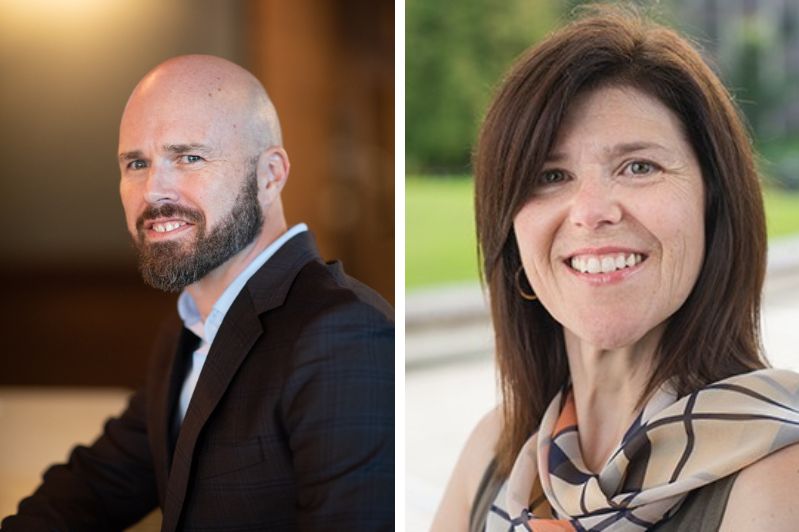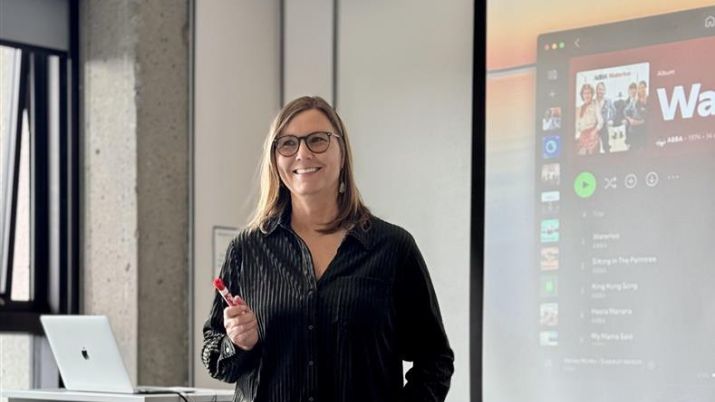
This interview is a retrospective on the latest The German Quarterly Forum, entitled “On Linguistic Indifference.” It was written by The Pipestone Group, of which CENES Head & Professor David Gramling and Associate Professor Caroline Rieger are members.
Beyond the lively exchange among ten German Studies professors from across North America, the forum was written to inspire a discussion on linguistic indifference in academic settings across this continent and beyond. Likewise, this interview — in which David and Caroline take turns asking each other questions — is meant to stimulate an exploratory exchange on the topic at UBC. We are eager to hear what UBC students and colleagues think!
What we mean by “linguistic indifference” will gradually become clear in the interview. But, in a nutshell, it is the disregard of language-specific aspects in communication, culture, learning, behavior, industry, or any other sector of human life.
Caroline Rieger (CR): David, what was your first experience with linguistic indifference that made you aware of the phenomenon? And what was your reaction?
David Gramling (DG): My earliest conscious memory of linguistic indifference was in sixth grade in Central Massachusetts, when I noticed my peers in Spanish class trying very hard to ignore pronunciation differences between English and Spanish. It was almost like they felt some kind of social duty to ignore the particular sounds and rhythms of Spanish and to superimpose the normative sounds of English upon them. In this way, linguistic indifference can be very aggressive, though easy to overlook. I have a vivid memory of a boy named Mike absolutely refusing to try pronouncing the word equipaje, as though it would be some kind of moral treachery or social taboo for him to do so. How can 10 year-olds already have become scared off from hearing and trying out different ways of using sound and accent in language?
DG: OK, my turn to ask a question. What is an important example of linguistic indifference that you think UBC students should be aware of?
CR: Though we learn, work and play on stolen land, where for thousands of years Indigenous languages have been spoken, a large majority of UBC students don’t learn that these Indigenous languages were frequently stolen along with the land. They don’t learn about the devastating consequences of that theft — for Indigenous individuals, for Indigenous Peoples, for the global community. Many of us expect Indigenous students, faculty and staff to speak English without giving it a second thought. Yet, this colonial language is the language of the people who stole the land, and who attempted to steal ancestral languages and cultures by re-writing history and by forcing children into Residential Schools. Ignoring language theft and its consequences means ignoring that, because of colonialism, English remains the dominant language in the 21st century (with all the harmful consequences, past and present, that this entails). These are forms of linguistic indifference that UBC students should be fully aware of, more than just a superficial acknowledgement from time to time.
DG: How can students effectively counter linguistic indifference in their studies and university experience? Why should they do so?
CR: A potential first step would be becoming curious about additional languages and cultures. This could take the form of learning an additional language or developing an interest in the languages their peers speak, especially their peers who do not speak English as a first language. Learning about experiences related to the fact that many are studying and living in an English-speaking environment for the first time, then actively listening to and reflecting on what their peers share. This could also take the form of (thought) experiments: How would their everyday life change if they had to study and/or work in a French-speaking environment, a Cree-speaking environment, a Cantonese-speaking environment? What would excite them about such a scenario? What would scare them? How would they prepare for it? How do they think it would change who they are?
On a somewhat more academic level, an option would be taking a critical, questioning stance towards the texts we read. For instance, many of the texts that we work with (at university and beyond) are translated texts. Can you tell if a text is translated? How? Whenever we read a translation of a text, we do not read the original author’s thoughts but the translator’s interpretation of those thoughts, and also certain intentions of the translator that are based on the translator’s ideological approach to translating. In other words, while we have all heard about the phrase “lost in translation”, we might be less aware that there is also something added in translation. How should that change how we “consume” texts? How can we develop an awareness for what is lost or added in translation? Taking courses on translation, multilingualism, literature or film (in translation), on media, on fine arts can support the development and appreciation of such skills.
CR: I like this question so much that I am curious to hear how you would respond to it. Here is the question again: How can students effectively counter linguistic indifference in their studies and university experience?
DG: Some quick-wins against linguistic indifference, no matter what discipline you’re in: Always ask about who translated what, and when/why they did it. Translations don’t just pop out of the sky! Also, always ask how and whether a concept or practice came to us from another linguistic context. Most important concepts, ideas, methods, and practices didn’t arise first in English, and you want to know what their itinerary has been. Even words like “innovation” have a fascinating and important multilingual history. This first known expository usage of “innovation” is set in the silver mines outside of Ancient Athens, which—for lack of labor power—had long been underutilized, despite Athenians’ unabating thirst for wrought silver jewelry and weapons. “Why, it may be asked, are fewer new cuttings [kainotomia, “innovations”] made nowadays than formerly?” writes Xenophon. So “innovation” is originally a term from silver mining practice, meaning “new cuts”. These were always dangerous to workers, benefitting only the wealthy who would ultimately wear the jewelry.
CR: Fascinating example, David! This brings me to my last question. What do you want UBC colleagues in “non-Arts” programs (such as Forestry or Pharmacology) to know about linguistic indifference? Why should they care?
DG: In some ways, I think it’s unfortunate that “languages” are usually associated with Arts and Humanities, when they are equally consequent for every discipline and sector across campus, because different languages house different and profound knowledge systems around practical technique and abstract reasoning. What if the various COPs (Conferences of the Parties to the United Nations Framework Convention on Climate Change) and other industrial policy assemblies around the world made it standard protocol to do their research and design through multilingual means—on the premise that averting climate disaster requires Indigenous and non-English meaning-making repertoires and not just Anglophone ones? Faculties beyond Arts are full of multilingual researchers and teachers, though they may not feel encouraged to share multilingual knowledge with students because both the curriculum and the credentialing discipline presumes an Anglophone frame.
DG: And here is my last question for you: Beyond the obvious (teaching additional languages), how does a department like ours help to undo/ dismantle linguistic indifference? And why does this work matter?
CR: I would think that all of our courses — whether taught in Danish, English, German, Polish, Russian, Swedish, Ukrainian or Yiddish, whether focusing on culture, film, history, language, linguistics, literature, media, politics, thought or any other topic area — that all of our courses, through varying degrees, would promote the acquisition of insights into language and ideology, non-Anglophone cultures, othering, social injustices. By doing so, we contribute to an appreciation of linguistic diversity and create spaces of reflection and questioning, spaces of belonging, spaces where differences are not only welcome, certainly not explained away, but celebrated and valued for the riches that they represent.
This matters because it deepens students’ awareness and understanding of the power of language, discourse, and ideology and how easily this power can be abused. In my opinion, this is a vital skill in a post-truth era, an era of deep fakes, an era of reactionary populism. It matters because it deepens students’ understanding of our complex world and its peoples, it strengthens their appreciation of the riches and benefits of diversity. We live in very complex times with very complex problems that we will not solve by ignoring them or by doing what we have always done, how we have always done it. Complex problems require complex solutions, solutions that combine different ways, different thoughts, solutions that include, not exclude, solutions that meet the needs of all the people, especially the most vulnerable people, who are all too often forgotten.

